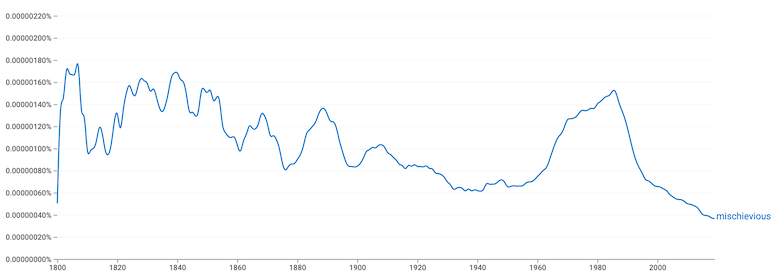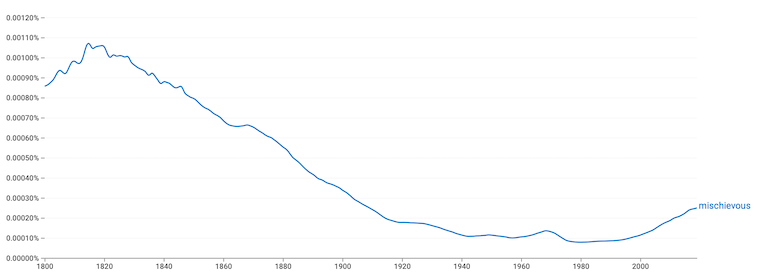During the past week, I spent a lot of time with my grandsons in various playgrounds. At one of them, the three-year old was at the top of a slide, about to go down. A woman who was there with her daughter looked at him and said to me, “Look at his mischievious smile!” And it is true, my younger grandson does have a mischievous smile. But what struck me was that the woman said “mischievious”, pronouncing the last five letters as two syllables ‘vee-yes’, instead of the single syllable “vous”.
It was not the first time I had heard people pronounce it this way. Her comment made me wonder if this was a regional variation so I looked it up and found this article about it.
Mischievous is the standard spelling of the adjective meaning causing mischief. Mischievous is a misspelling, but it is so common that it may someday gain acceptance. For now, it doesn’t regularly appear in edited writing, and dictionaries and spell check have yet to accept it, for what that’s worth.
The misspelling is not new. The OED lists instances of mischievious going back to the 17th century, and a Google Books search reveals a few thousand instances from before 1920. So while mischievous is certainly the standard spelling and is safer in formal writing and school papers, using mischievious is not a grievous error in informal contexts.
The misspelled form is rare in 21st-century published writing because spell check catches it, but it does appear from time to time, even in edited publications.
With languages, usage often determines whether something is ‘correct’ or not, with more common usage causing what was once considered incorrect transitioning into becoming accepted. However, the use of ‘mischievious’ has dropped dramatically in the last few decades. It is now just a quarter of its use compared to its most recent peak in 1985.
Meanwhile the use of ‘mischievous’ has nearly tripled in that same time period. At the present time, ‘mischievous’ is used about 700 times more frequently than ‘mischievious’.
The idea that spellcheck software may be discouraging the use of ‘mischievious’ gains some support from these Ngram data because the first spell checker software was developed for mainframe computers in the late 1970s, with the first for personal computers in 1980.
It is interesting that spell checkers may be the modern arbiters of spelling, since people are more likely to be confronted by it than look up traditional reference sources like dictionaries.



Amusingly Mano, you seem to have become an unwitting example of your own thesis. In the second sentence of your quote, the word is incorrectly (correctly) spelled, while in the Grammarist article it is correctly (incorrectly) spelled. Looks like maybe your autocorrect “helped” you when you didn’t intend it to.
In a twist application of Muphry’s Law, the author spelled it correctly both times there.
Good, mischievious is ugly in both spelling and sound.
“Meanwhile the use of ‘mischievous’ has nearly tripled in that same time period.”
This surprised me a bit. I rarely use the word myself, too many syllables plus two dipthongs makes it a chore both to speak and to spell. My small random sampling of Google Books’ results of recent books using it seems to indicate it is often found in children’s books, and particularly epublished children’s books. I’m just guessing here, but I can think of two reasons for a children’s book author to use ‘mischievous’: either they are engaging in intentional wordplay to show children the fun that can be had with it, or they are consciously or unconsciously trying to emulate the Victorian style of many famous children’s books.
So maybe the internet is giving a boost to ‘mischievous’ it would not have received in the world of paper-publishing alone.
I guess both my wife and I have been mispronouncing it for years. We’ve heard it as “mischievous”, so it’s not like we’ve never been exposed to the proper pronunciation, but we both learned to say, and still say it as, “mischievious”. It may be hard for us to switch as we both like the sound of the four-syllable version. Mis-CHE-vee-ous kind of rolls off our tongues like a vintage sherry. It’s fun to say, even if it’s incorrect.
I would be careful about taking too much notice of the decline in written documents since the advent of spell-checkers. That only shows what the written form of the word being used is. Pronunciation does not need to follow the spelling. There are a lot of examples, from “Thames”, to “Luxury-Yacht” (pronounced Throat-wabbler Mangrove). I have no idea if pronunciation is following the correction in spelling in for “mischievous”.
I have always pronounced and spelled it as the four syllable form, which is not erroneous.
It’s obvious that it’s a variant, even though some dictionaries claim otherwise.
Furious, curious, oblivious, ingenious.
.
Devious.
‘mischievious’ is precisely as correct as ‘grievious’, which is to say not at all.
Yes the French influence on English resulted in several couplets. The poem which I quoted in my previous comment is also found in the comments to this post about mischievous vs mischievious. (Plus a David Marjanovic sighting)
https://languagehat.com/mischievious/
The discussion is quite lively and humorous.
Peevery is a word that spell-check insists on turning to pervert.
Argh. Why does preview not show that messed up bold tag on previous until I hit post? I swear I closed it but my eyes are probably the culprit. Conjunctivitis is nearly as annoying as constantly fighting with correctly formatting html.
[I corrected it. Mano]
Orthography in English is idiosyncratic. How words are pronounced has little to do with it sometimes. The tough coughs as he ploughs the dough. I’m sure your sources are correct about how this particular word appears in printed documents. Me, I =hear= a lot of four-syllable mischievous here in Los Angeles. I get corrected… So much so so that when people pronounce it in the way that I think is correct, with three syllables, it is notable to me.
Pronunciations which bother me more than ‘mischievious’; ‘nucular’ for ‘nuclear’, and ‘coo de grah’ for coup de grace, which should be, more or less, ‘coo de grass’.
[I corrected it. Mano]
Thank you! I am peevish about my own errors.
I hate spell checkers and never use them because most are written by americans, containing incorrect spellings of words. I’m not willing to spend hours adding correct spellings of words that should already be in the lexicon. And I especially hate “autocheck” which highlights words, harassing me with unwanted “corrections”.
Pronunciations and syllable stresses? Oh, cripes. Voila is “vwah-la”, not “wah-la”. And who stresses the third syllable in “municipal”? You don’t stress the third when you say “municipality”.
Such words are a useful way to identify those who cannot, or will not, learn.
RobGrigjanis
I detest nucular, especially when uttered by a POTUS. I reflexively correct anyone who uses the grammatically incorrect ‘Gots’, but not if they pronounce ask as ax, as long as they write “I asked my Mother.” rather than “I axed my Mother.” I’m not bothered by the variants simply because Webster found them improper. I prefer colour in spelling, and pronunciation.
Don’t ever go to New London, CT, where they pronounce their river’s name as Thames to rhyme with the word flame. Ugh.
An NPR station in Michigan has a weekly segment called That’s What They Say. These 5-minute episodes explore our changing language. This reminds me of an episode about the word “exploitative”. That precise segment can be found near the end of episodes listed in the link below. There are many other interesting topics.
https://www.michiganradio.org/podcast/thats-what-they-say
I always thought “mischievious” obnoxious, and recall being surprised the first time I heard it from a grade school teacher, in part because she used that pronunciation even when reading the correctly spelled word. I never understood that.
The Connecticut “Thames” river is a shibboleth, like Berlin. Or like Houston Street in New York, or Charlotte or Adamant in Vermont. One of my favorites of this sort is Havre de Grace in Maryland, which I was informed is called there “Haverdegrass.”
I also detest “nucular,” which GW Bush liked, and “heliocopter,” a favorite of Ike. And I lament the misuse of “disinterested,” since the actual useful meaning must now be explained.